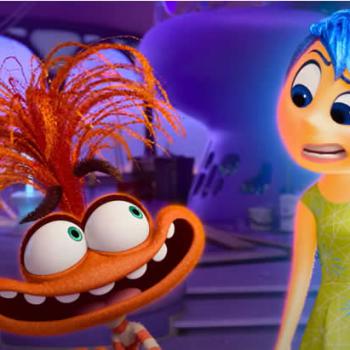God’s Not Dead 2, the predictably named sequel to 2014’s surprise hit God’s Not Dead, is a better movie than the first. It again suggests that Christian movies—even at their most Christian-y—are getting better. Many of the points the movie makes are valid. And I suspect that, for many Christians, this’ll be their favorite movie of the year.
But for me, this film fell short. Simply put: I think it’s hard to argue people into heaven.
God’s Not Dead 2 is predicated on argument, and fittingly much of it takes place inside a courtroom. Grace Wesley (played by Melissa Joan Hart), an irrepressibly bubbly history teacher, lands there after she dares utter the name of Jesus in her public school classroom—even though the name was used in a historical context. Grace is accused of proselytizing, and she’s forced to defend her actions in order to keep her job.
Her accusers are legion: Two parents bring a lawsuit against her, alleging her actions violated their freethinking ways. Her formerly supportive principal apparently wants her out. The Teacher’s Union rep complains that Grace never so much as popped a stick of gum in her mouth without saying a prayer. And, naturally, the American Civil Liberties Union—headed by the delightfully diabolical lawyer Pete Kane (Ray Wise)—is pulling the strings.
“We’re going to prove once and for all that God is dead!” he tells the parents.
That’s a fallacy, of course. Whether or not a teacher can mention Jesus in a classroom would seem to have little bearing on His divinity. While America’s religious liberty may be on trial here, God is not.
But everyone in the movie buys into the argument that this is a referendum on faith itself (rather than its expression), which gives the film license to draw its battle lines—Christians on one side, angry atheists on the other. It’s a good vs. evil drama in which one must take sides. Only one unbeliever breaks this mold: Grace’s attorney, Tom Endler. Even he at the end is shown reading a book of apologetics, suggesting it’s only a matter of time before he, too, turns to the light.
God’s Not Dead 2 is, in a sense, a war movie—a spiritual war, yes, but one fought in courtrooms and football fields, one where there are enemies, casualties and, most importantly, victors.
I understand that high profile, legal questions of religious freedom are incredibly important. But I wish the movie’s antagonists hadn’t been quite so … villainous. I’m not convinced that God understands this “war” in quite the same way we sometimes might. I don’t think He’d look at Pete Kane and the rest as enemies. They’re His handiwork as much as Grace is, after all. And I think that, when the world stops turning, He’d very much like to welcome them home.
I think that goes for the non-Christians who might watch this movie, too—the atheists, the agnostics, the doubters, the free-thinkers. This spiritual war, if we may call it that, isn’t against them. It’s for them. And if Christians wish to fight this sort of war effectively, I don’t think it’s productive to see unbelievers as the enemy. And I don’t think unbelievers, as such, will be particularly swayed by what they see here.
I love debates. I love a good argument. But I’m increasingly skeptical in how effective they are in changing how people think. Cogent, reasoned arguments for Christianity can form the framework for faith, but they can make for lousy front doors. When people step into faith for the first time, it’s often (though admittedly not always) under softer circumstances: They’re swayed by a loving, principled Christian in their lives. They are moved to tears by an old hymn they thought they forgot. In the relationship of faith, first our hearts are drawn to God. It’s only then that our brains seek to follow.
In Miracles From Heaven, little Anna Beam (Kylie Rogers) tells her parents that she saw God when she was, essentially, dead. That the fact that she’s alive right now is an honest-to-goodness divine miracle. Her parents caution her that there will be those that won’t believe her story. “That’s all right,” Anna says. “They’ll get there when they get there.”
That’s how most of us are, I think, when it comes to faith. We’ll get there when we get there. It’s not a matter of choosing sides, but finding our way.
God’s Not Dead 2 understands Anna’s point, I think. We see a sympathetic pastor walk a questioning soul patiently toward a better understanding of God. But for the most part, the movie’s premise is all about sides—and pushing people to take one. And frankly, it’s human nature to not want to be pushed.













